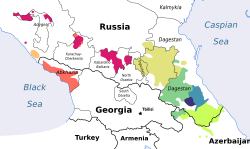Karata-Tukita language
Appearance
| Karata | |
|---|---|
| КIкIирлIи мацIцIи | |
| Region | Southern Dagestan |
| Ethnicity | Karata |
Native speakers | 260 (2010 census)[1] |
Northeast Caucasian
| |
| Language codes | |
| ISO 639-3 | kpt |
| Glottolog | kara1474 |
| ELP | Karata |
Karata is an Andic language of the Northeast Caucasian language family spoken in southern Dagestan, Russia by 260 Karata in 2010. It has two dialects, Karatin and Tokitin, which are quite different. Speakers use Avar as their literary language.[1]
There are ten towns in which the language is traditionally spoken: Karata, Anchix, Tukita, Rachabalda, Lower Inxelo, Mashtada, Archo, Chabakovo, Racitl, and formerly Siux.[2]
Phonology
Vowels
This section is empty. You can help by adding to it. (January 2010) |
Consonants
| Labial | Dental | Alveolar | Palatal | Velar | Uvular | Pharyn- geal |
Glottal | ||||||||
|---|---|---|---|---|---|---|---|---|---|---|---|---|---|---|---|
| central | lateral | ||||||||||||||
| lenis | fortis | lenis | fortis | lenis | fortis | lenis | fortis | lenis | fortis | ||||||
| Nasal | m | n | |||||||||||||
| Plosive | voiced | b | d | ɡ | |||||||||||
| voiceless | p | t | k | ʔ | |||||||||||
| ejective | (pʼ) | tʼ | kʼ | ||||||||||||
| Affricate | voiced | (d͡ʒ) | |||||||||||||
| voiceless | t͡s | t͡sː | t͡ʃ | t͡ʃː | t͡ɬː | k͡xː | q͡χː | ||||||||
| ejective | t͡sʼ | t͡sːʼ | t͡ʃʼ | t͡ʃːʼ | t͡ɬː | t͡ɬːʼ | k͡xːʼ | q͡χːʼ | |||||||
| Fricative | voiceless | s | sː | ʃ | ʃː | ɬ | ɬː | ç | x | xː | ʜ | h | |||
| voiced | v | z | ʒ | ɣ | ʢ | ||||||||||
| Trill | r | ||||||||||||||
| Approximant | l | j | |||||||||||||
- The glottal stop transcribed here is named rather ambiguously a "glottalic laryngeal" by the source.
References
- ^ a b Karata at Ethnologue (18th ed., 2015) (subscription required)
- ^ Nichols, Johanna (2006). "Review: Karatinsko-russkij slovar' [Karata-Russian Dictionary]". Anthropological Linguistics. 48 (1): 95–98. ISSN 0003-5483.
- ^ Consonant Systems of the North-East Caucasian Languages on TITUS DIDACTICA


